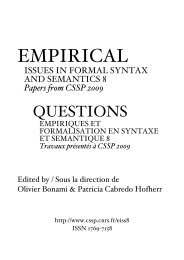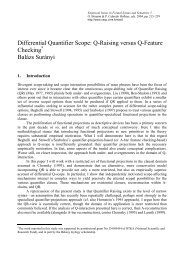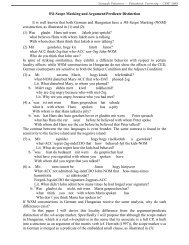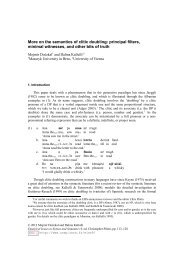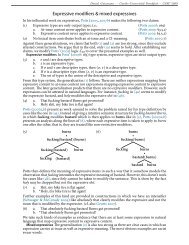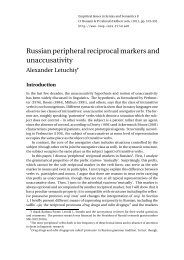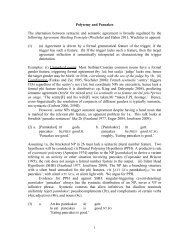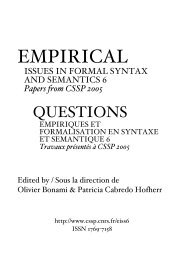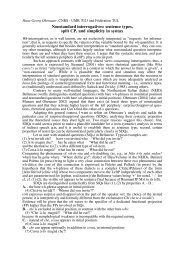Empirical Issues in Syntax and Semantics 9 (EISS 9 ... - CSSP - CNRS
Empirical Issues in Syntax and Semantics 9 (EISS 9 ... - CSSP - CNRS
Empirical Issues in Syntax and Semantics 9 (EISS 9 ... - CSSP - CNRS
Create successful ePaper yourself
Turn your PDF publications into a flip-book with our unique Google optimized e-Paper software.
do not share the same foot<strong>in</strong>g. The existential presupposition is the only one that passes<br />
st<strong>and</strong>ard projection tests for presupposition. That is, (8a) follows from each of (7a-d), but (8b)<br />
obviously does not.<br />
(7) a. It was a cake that Mary baked.<br />
b. It wasn’t a cake that Mary baked.<br />
c. Was it a cake that Mary baked?<br />
d. If it was a cake that Mary baked, we’re all go<strong>in</strong>g to be sick.<br />
(8) a. Mary baked someth<strong>in</strong>g.<br />
b. Mary didn’t bake anyth<strong>in</strong>g other than a cake.<br />
Three ma<strong>in</strong> types of analysis exist for expla<strong>in</strong><strong>in</strong>g where the exhaustive <strong>in</strong>ference <strong>in</strong> (ii)<br />
comes from: scholars either argue that it is entailed (i.e. the cleft semantically contributes<br />
exhaustivity to the mean<strong>in</strong>g of the sentence), that it is derived from a presupposition, or that it<br />
is implicated. Yet, some problems arise with each of these analyses. First, if exhaustivity were<br />
<strong>in</strong>deed entailed, orig<strong>in</strong>at<strong>in</strong>g <strong>in</strong> Bol<strong>in</strong>ger 1972 <strong>and</strong> argued for <strong>in</strong> Atlas & Lev<strong>in</strong>son 1981, the<br />
cont<strong>in</strong>uations (a-d) to (9) below would be <strong>in</strong>formative <strong>and</strong> felicitous. However, it is simply not<br />
the case. The cont<strong>in</strong>uations are <strong>in</strong>felicitous precisely because the cleft does not assert anyth<strong>in</strong>g<br />
about exhaustivity, <strong>and</strong> is therefore <strong>in</strong>consistent. In order to be felicitous, what is needed is the<br />
explicit <strong>in</strong>dication of exhaustivity, for example by <strong>in</strong>sert<strong>in</strong>g an exclusive particle like ‘only’ as<br />
illustrated <strong>in</strong> the cont<strong>in</strong>uations (a’-d’). The experiment presented <strong>in</strong> §3 also provides evidence<br />
that exhaustivity is not asserted.<br />
(9) I know that Mary baked a cake, …<br />
a. #but it wasn’t a cake that she baked!<br />
b. #but was it a cake that she baked?<br />
c. #but I’ve just discovered that it was a cake that she baked!<br />
d. #if it was a cake that she baked, then we’re all <strong>in</strong> trouble.<br />
a’. but it wasn’t only a cake that she baked!<br />
b’. but was it only a cake that she baked?<br />
c’. but I’ve just discovered that it was only a cake that she baked.<br />
d’. if it was only a cake that she baked, then we’re all <strong>in</strong> trouble.<br />
The second type of approach, defended for example <strong>in</strong> Percus 1997 <strong>and</strong> Hedberg 2000<br />
assumes that exhaustivity is <strong>in</strong> a sense presupposed. The biggest problem fac<strong>in</strong>g<br />
presuppositional analyses, as mentioned above, is that exhaustivity does not seem to project out<br />
of st<strong>and</strong>ard embedd<strong>in</strong>gs as shown below, where (10b) does not follow from (10a).<br />
(10) a. If it is Paul <strong>and</strong> Mary who arrived, the party is about to start.<br />
b. Nobody else arrived.<br />
F<strong>in</strong>ally, Horn (1981) suggests that clefts only conversationally implicate exhaustivity. In<br />
general, Horn claims that any device which asserts P(x) <strong>and</strong> presupposes that there exists an x<br />
such that P(x) gives rise to the follow<strong>in</strong>g conversational reason<strong>in</strong>g: if there were others<br />
contextually relevant <strong>in</strong>dividuals that satisfy P, the speaker would have mentioned them. S<strong>in</strong>ce<br />
he did not, there are not. The only difficulty that appears with this pragmatic account concerns<br />
another characteristic of conversational implicatures: cancelability. Horn illustrates such a<br />
99



